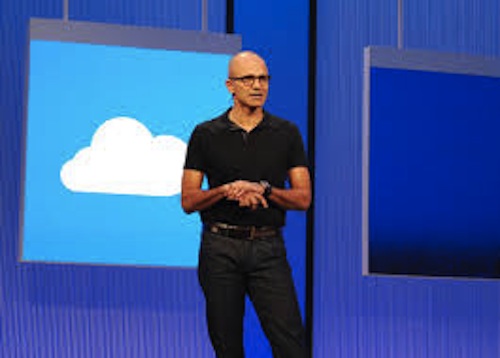Satya Nadella is supposedly going to be the next CEO of Microsoft (although plans are not final), and if he is, it means two important things in the business / technology world. Let’s start with a little bit of context.
First off, people love to write the obit of Microsoft, although it’s really still doing quite well. I went out there for a job interview last October — didn’t get it, because that’s my life — and when I didn’t get it, I was quick to be like (in my own head, as I pounded brews at SEA-TAC) “Well, Google out-innovates them and they missed on the iPad and Apple and Google and yea start-ups and yea they’re a dinosaur.” That’s a stupid argument because (a) Google and Apple probably ain’t gonna hire me either and (b) well, if Microsoft just kept making Office year-over-year and that’s it, they’d still be a remarkably important company for the way we live and work. How often do people send you written documents in anything except Word? How often do you see a presentation in anything other than PowerPoint? (This one might be shifting, but it’s still rare.) Say what you will, but they made almost $25 billion — with a b — in Q2 of this year in revenue. That’s impressive and big-time, so whoever was going to become CEO of Microsoft is an important hire — both for the future of Microsoft, but also for the future of technology companies and business as a whole. This company, although it has whiffed on a few things here and there, still means something. And hey, remember Google Wave?
Alright, so here’s why it’s important that it might be Satya Nadella: first off, he’s been at Microsoft since 1992. That’s basically two decades. For a long time, people thought Microsoft was going to go get Alan Mullaly, the CEO of Ford. They also flirted with this guy Steve Mollenkopf from Qualcomm and there were even rumors about Elon Musk (less rumors and more people talking him up). Thing is, none of those people, however successful they’ve been, are Microsoft people. They’d be coming into a distinct culture and having to learn that (on the fly) while also approving big-time decisions and trying to keep the stock price consistent. That’s complicated, but often in America, big companies think “poach” is more important than “develop.” This happens probably more egregiously at the middle levels — people are kind of replaceable, because if you post a job, you’ll get about 200 applications in six days, so iz all good — but it happens at the C-Suite level too. Companies want to make a splash and keep their investors confident with a big name; this is the same reason sports franchises want high-priced free agents. You’re always looking to appease your user base. But while a WR just needs to learn a playbook and work with a new QB, a CEO has to understand an ingrained culture of 10Ks worth of employees. Poach, then, makes logical sense but not practical sense — develop is the way to go, especially when you consider that what binds an employee to an organization, outside of compensation, is really the amount of training they get. Microsoft staying in-house (if he’s the pick) and going with a 2o-year veteran is a good move for the entirety of the business world to see.
The other thing is that Nadella, currently, basically has final oversight on developer tools and cloud services for Microsoft. So you’re going to see Microsoft, a company that built itself on some of the most relevant software in the world, now being led by someone whose career is based on hardware and the cloud. That’s a super-interesting shift that kind of foreshadows where tech as a whole might be headed.
Overall, it’s a conservative choice, but a good one:
Nadella would certainly represent a conservative choice for Microsoft. He’s a sharp, persuasive individual who has spent more than 20 years working at the company. Crucially, he’s more or less Microsoft’s cloud master and has a firm handle on what it takes to run Bing, Office365, Skype, and Xbox Live. Nadella is also well-liked and respected throughout the industry. And he’s enough of a different character from Steve Ballmer and Bill Gates to inject some new life into the company.
You could also view this as Microsoft directly going at Amazon Cloud Services and similar offers from Google.
However the narrative is ultimately written — be it about the software-hardware flip, the future of the cloud, or promoting internally — it’s an interesting hire for one of the bigger companies in the world (again, if true). It will be cool to see what type of company Microsoft is in 10 years.
